-
ORIGINAL ARTICLE07-29-2024
Evidence of validity of the Risk Self-Medication Questionnaire focused on Health Literacy
Revista Brasileira de Enfermagem. 2024;77(3):e20230386
Abstract
ORIGINAL ARTICLEEvidence of validity of the Risk Self-Medication Questionnaire focused on Health Literacy
Revista Brasileira de Enfermagem. 2024;77(3):e20230386
DOI 10.1590/0034-7167-2023-0386
Views0See moreABSTRACT
Objectives:
to analyze the validity evidence of the internal structure of the Risk Self-Medication Questionnaire Focused on Health Literacy.
Methods:
a psychometric study with 499 adults. The internal structure was assessed with exploratory and confirmatory factor analysis to prove the adjustment. Internal consistency was measured by composite reliability and McDonald’s omega coefficient (ω).
Results:
the parameters revealed a model of 35 items distributed across four factors, explaining 56% of the total variance, with factor loadings ranging from 0.31 to 0.85 and adequate communalities. Accuracy (0.79
Conclusions:
an instrument was obtained with good evidence of structural validity for measuring self-medication.
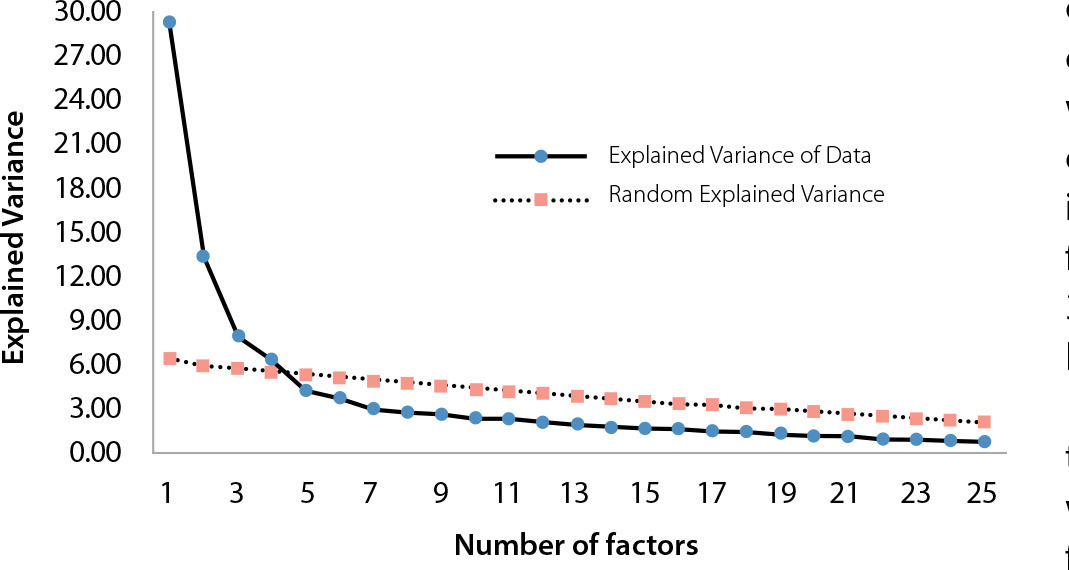
-
ORIGINAL ARTICLE07-29-2024
Nurses’ perspectives on nurses’ work methods
Revista Brasileira de Enfermagem. 2024;77(3):e20230374
Abstract
ORIGINAL ARTICLENurses’ perspectives on nurses’ work methods
Revista Brasileira de Enfermagem. 2024;77(3):e20230374
DOI 10.1590/0034-7167-2023-0374
Views0See moreABSTRACT
Objectives:
To analyze nurses’ perspectives on nurses’ work methods in the hospital context.
Methods:
A descriptive study with a qualitative approach was conducted in a hospital in northern Portugal, involving 17 nurses. Semi-structured interviews were used for data collection. Data collected between May and June 2023 underwent content analysis, supported by Atlas.ti software.
Results:
Three thematic areas emerged: “Nurses’ work methods in a hospital context,” highlighting the conception and components of work methods and the methods in use; “Implementation of nurses’ work methods,” emphasizing influencing factors and challenges to implementation; and “Impact of nurses’ work methods on patients, nurses, and institutions.”
Final Considerations:
Nurses’ work methods constitute the structure of nursing care. Some factors influence and some challenges arise in the implementation of these methods, producing impacts on patients, nurses, and institutions.

-
ORIGINAL ARTICLE07-29-2024
Nursing Process for institutionalized older adults: contributions from knowledge awareness workshop
Revista Brasileira de Enfermagem. 2024;77(3):e20230349
Abstract
ORIGINAL ARTICLENursing Process for institutionalized older adults: contributions from knowledge awareness workshop
Revista Brasileira de Enfermagem. 2024;77(3):e20230349
DOI 10.1590/0034-7167-2023-0349
Views0See moreABSTRACT
Objective:
To analyze the knowledge of professionals working in a Nursing Home about the Nursing Process before and after the awareness workshop.
Methods:
This is strategic action research, developed with nursing professionals and managers of a Nursing Home in Rio Grande do Sul, Brazil. Data were collected between January and June 2023, through semi-structured interviews before and after an awareness workshop. Discursive textual analysis of the data was carried out.
Results:
The central category “Understanding about the Nursing Process in Nursing Homes” emerged, which was unitized into two units of meaning and three categories of analysis.
Conclusion:
Data revealed non-use and lack of knowledge of the Nursing Process before awareness raising. Afterwards, a deeper understanding of the topic and its importance was identified. Awareness-raising workshops contribute to transformation of knowledge.
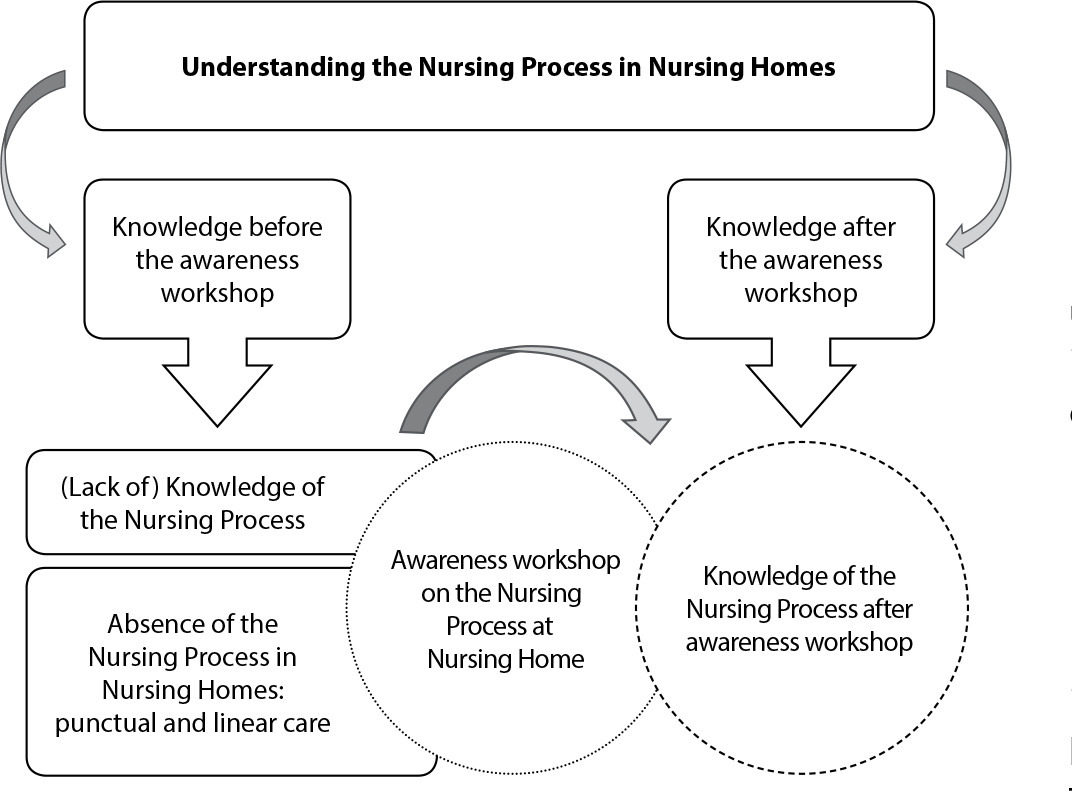
-
ORIGINAL ARTICLE07-29-2024
Excessive daytime sleepiness in nursing technicians: association with sleep quality and memory
Revista Brasileira de Enfermagem. 2024;77(3):e20230332
Abstract
ORIGINAL ARTICLEExcessive daytime sleepiness in nursing technicians: association with sleep quality and memory
Revista Brasileira de Enfermagem. 2024;77(3):e20230332
DOI 10.1590/0034-7167-2023-0332
Views0See moreABSTRACT
Objective:
to investigate excessive daytime sleepiness prevalence among nursing technicians and the association with sleep quality and memory.
Methods:
a cross-sectional, inferential study, carried out in a hospital unit in the state of Goiás between December 2020 and January 2021. Assessments were carried out using the Epworth Sleepiness Scale, the Pittsburgh Sleep Quality Index and the Prospective and Retrospective Memory Questionnaire, instruments validated for the Brazilian context. Bivariate and multivariate logistic regression analyzes were performed.
Results:
the sample consisted of 189 nursing technicians with a 40.9% excessive daytime sleepiness prevalence. In multivariate models, excessive daytime sleepiness was not associated with sleep quality, however there was a significant association with overall memory failures.
Conclusions:
study results demonstrate a high excessive daytime sleepiness occurrence, an association with overall memory failures and the need for psychosocial interventions for nursing technicians.
-
ORIGINAL ARTICLE07-29-2024
Educational technology for multidisciplinary training for managing waiting lists for elective patients
Revista Brasileira de Enfermagem. 2024;77(3):e20230299
Abstract
ORIGINAL ARTICLEEducational technology for multidisciplinary training for managing waiting lists for elective patients
Revista Brasileira de Enfermagem. 2024;77(3):e20230299
DOI 10.1590/0034-7167-2023-0299
Views1See moreABSTRACT
Objectives:
to construct and assess an educational technology for managing patient waiting lists for multidisciplinary training.
Methods:
study supported by Instructional Design – ADDIE model, whose stages of construction of educational technology were developed in the form of a multi-professional training course. Its respective content assessment was carried out by a committee of experts from 2021 to 2022. The analysis occurred based on the proportion of content adequacy with 95% Confidence Interval.
Results:
seventeen products were created as educational technology learning objects: five storyboards; four videos; three comic books; two pedagogical action plans; a mind map; and a YouTube® playlist. Nine experts assessed content adequacy, which reached 0.89.
Conclusions:
this educational technology contributes to the performance of professionals who manage waiting lists by reducing inequalities, alleviating differences, in addition to promoting equity in care and good health for patients in the Brazilian Health System.

-
ORIGINAL ARTICLE07-29-2024
Fuzzy Logic: vulnerability of women who have sex with women to sexually transmitted infections
Revista Brasileira de Enfermagem. 2024;77(3):e20230271
Abstract
ORIGINAL ARTICLEFuzzy Logic: vulnerability of women who have sex with women to sexually transmitted infections
Revista Brasileira de Enfermagem. 2024;77(3):e20230271
DOI 10.1590/0034-7167-2023-0271
Views0ABSTRACT
Objective:
To describe the possibility of applying Fuzzy Logic in analyzing the vulnerability of Women Who Have Sex with Women to Sexually Transmitted Infections/HIV/AIDS.
Methods:
We developed a Fuzzy Logic system with 17 input variables and one output variable, using data related to vulnerability in a municipality located in the Midwest region of the State of São Paulo, Brazil.
Results:
The factor with the greatest positive impact was the confirmation that a low understanding of Sexually Transmitted Infections/HIV/AIDS is associated with higher vulnerability. Conversely, the statement “Not disclosing sexual activity to healthcare professionals,” where individuals do not admit to having sex with women, had the least impact.
Conclusions:
Fuzzy Logic facilitates the identification of vulnerability, expressed through the analysis of interaction between variables in each dimension. This makes it a promising method to assist in analyzing the vulnerability of specific populations.
Keywords:Fuzzy LogicHealth VulnerabilityReproductive HealthSexually Transmitted DiseasesWomen Who Have Sex With WomenSee more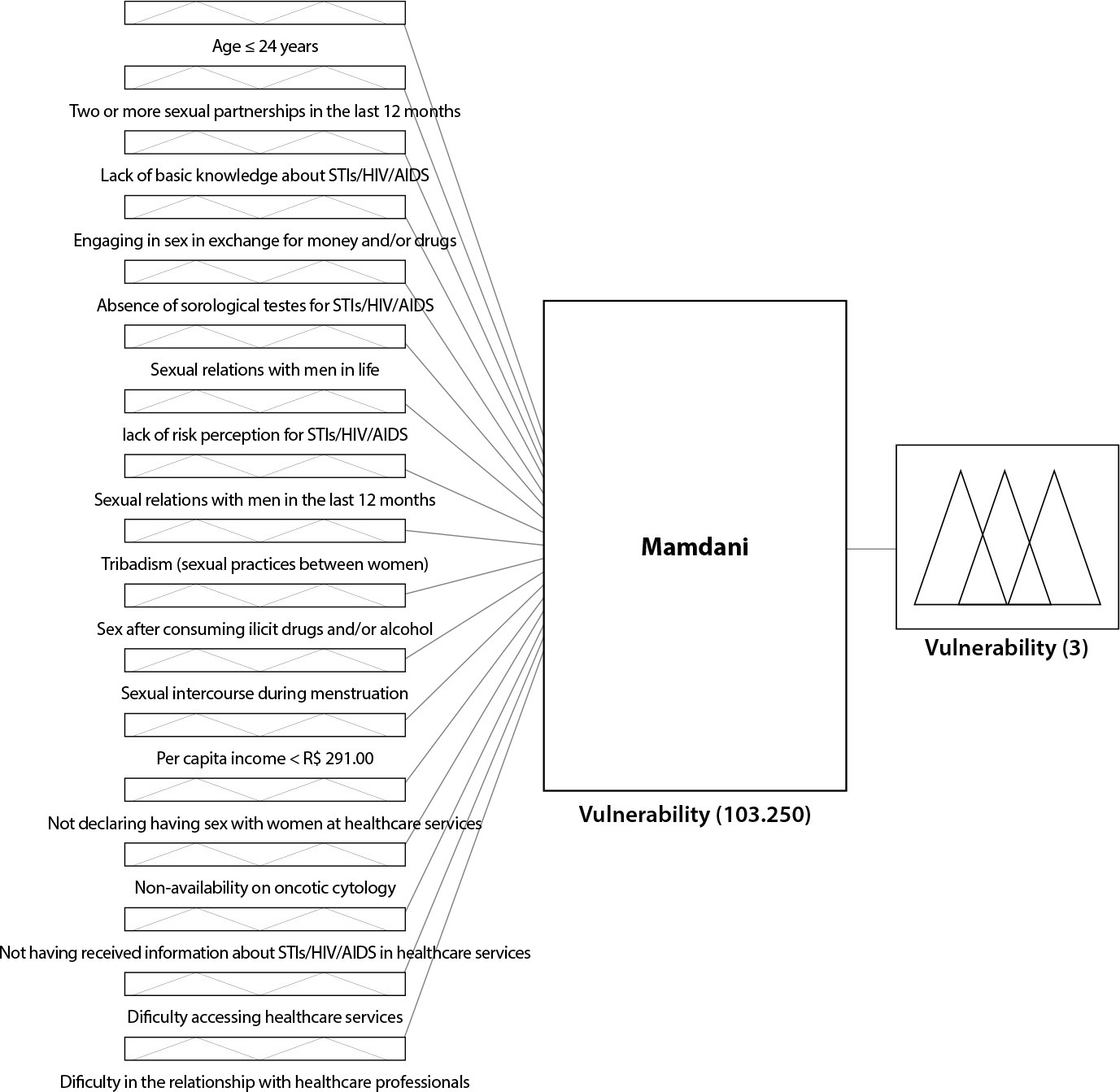
-
ORIGINAL ARTICLE07-29-2024
University Student Depression Inventory, Brazilian Version, Construct Assessment
Revista Brasileira de Enfermagem. 2024;77(3):e20230232
Abstract
ORIGINAL ARTICLEUniversity Student Depression Inventory, Brazilian Version, Construct Assessment
Revista Brasileira de Enfermagem. 2024;77(3):e20230232
DOI 10.1590/0034-7167-2023-0232
Views0See moreABSTRACT
Objectives:
to assess the University Student Depression Inventory, Brazilian version (USDI-BR), construct.
Methods:
a methodological study carried out with a snowball probabilistic sample, consisting of 334 undergraduate and graduate students. Confirmatory factor analysis, reliability using McDonald’s omega coefficient and Cronbach’s alpha were performed. Principal component analysis was performed using the varimax rotation and oblimin rotation, using the Kaiser-Meyer-Olkin criteria, Bartlett’s test of sphericity and scree plot.
Results:
the USDI-BR presented an internal consistency of items of ω = 0.95 and remained with 30 items, with the addition of 1 factor (Death wish and social withdrawal), totaling 4 factors.
Conclusions:
the USDI-BR has evidence that points to its validity and also its internal consistency, deserving that new studies be carried out to expand the evidence of its psychometric properties.
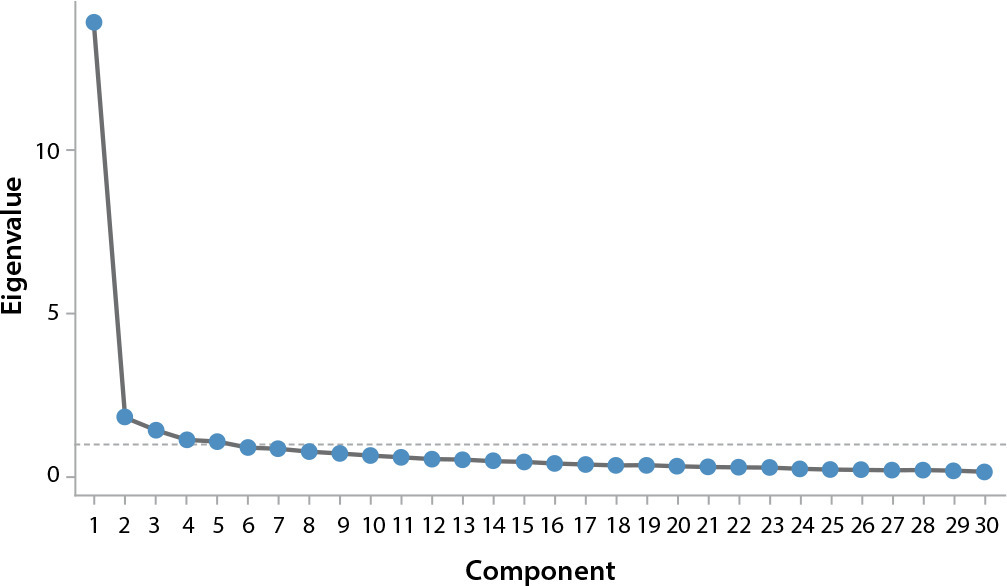
-
ORIGINAL ARTICLE07-29-2024
Family refusal of skin donation for transplantation: trends and associated factors
Revista Brasileira de Enfermagem. 2024;77(3):e20230209
Abstract
ORIGINAL ARTICLEFamily refusal of skin donation for transplantation: trends and associated factors
Revista Brasileira de Enfermagem. 2024;77(3):e20230209
DOI 10.1590/0034-7167-2023-0209
Views0See moreABSTRACT
Objectives:
to analyze the trends and factors associated with family refusal of skin donation for transplantation.
Methods:
this cross-sectional study was conducted in the State of São Paulo, with family authorization terms collected from 2001 to 2020. The variables analyzed included year, age, gender, cause of death, and type of institution. Data were analyzed using linear and multiple logistic regression, with the Odds Ratio estimated at p<0.05 for statistical significance.
Results:
1,355 individuals refused skin donation. The trend of refusals decreased between 2001 and 2009 in the age groups of 0-11 years and 12-19 years, but increased in the group aged ≥60 years. This trend continued to decrease in the 0-11 years group from 2010 to 2020, and increased in the 20-40 years group. Males and the age groups of 20-40 years, 41-59 years, and ≥60 years exhibited 27%, 34%, 47%, and 53% lower chances of refusal, respectively.
Conclusions:
there is an urgent need for measures to mitigate the high number of refusals associated with skin donation.
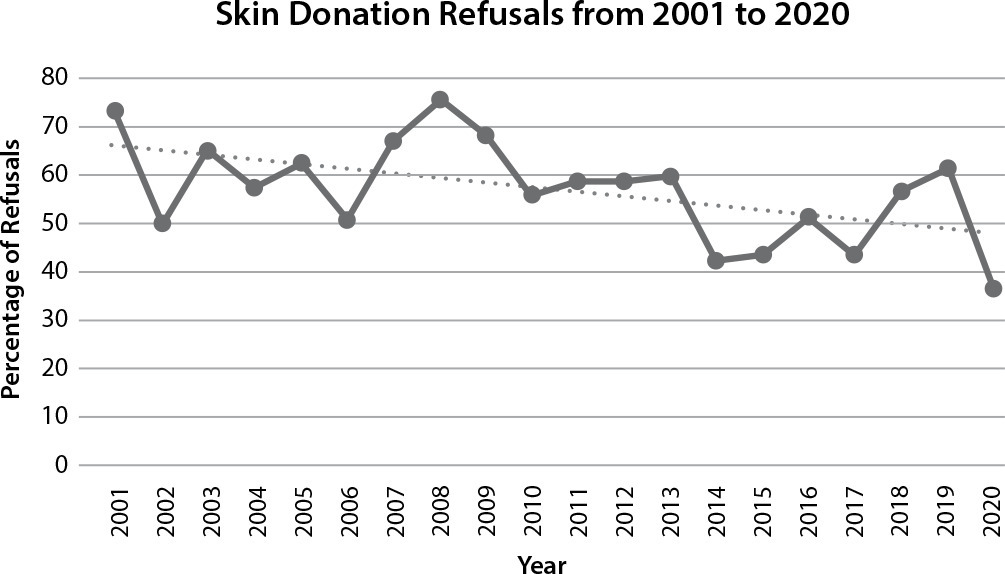
-
ORIGINAL ARTICLE12-04-2023
30-Year High Cardiovascular Risk Incidence and its Determinants: CUME Study
Revista Brasileira de Enfermagem. 2023;76(6):e20220544
Abstract
ORIGINAL ARTICLE30-Year High Cardiovascular Risk Incidence and its Determinants: CUME Study
Revista Brasileira de Enfermagem. 2023;76(6):e20220544
DOI 10.1590/0034-7167-2022-0544
Views0See moreABSTRACT
Objective:
Estimate the incidence of the 30-year high cardiovascular risk and its determinants among graduates of federal universities in Minas Gerais.
Methods:
This is a prospective cohort of 2,854 adults aged 20 to 59. The incidence of the outcome was calculated using the Framingham equation and its determinants were determined through multivariate Cox regression.
Results:
After an average of 2.62 years, the incidence of high cardiovascular risk was 8.09 and 20.1 cases per 1,000 person-years, for females and males respectively. Being male (HR: 2.34; 95% CI: 1.58 – 3.46), employment (HR: 2.13; 95% CI: 1.13 – 3.99), high consumption of processed foods (HR: 2.44; 95% CI: 1.21 – 4.90), and being physically active (HR: 0.63; 95% CI: 0.41 – 0.98) were associated with high cardiovascular risk.
Conclusions:
Among highly educated adults, being male, employment, and high consumption of processed foods are predictors of high cardiovascular risk, while being physically active acts as a protective factor.
-
ORIGINAL ARTICLE12-04-2023
“Fala-M@no-COVID-19”: technological development of a health navigation program for men during the pandemic
Revista Brasileira de Enfermagem. 2023;76(6):e20220534
Abstract
ORIGINAL ARTICLE“Fala-M@no-COVID-19”: technological development of a health navigation program for men during the pandemic
Revista Brasileira de Enfermagem. 2023;76(6):e20220534
DOI 10.1590/0034-7167-2022-0534
Views0See moreABSTRACT
Objective:
to develop a care-educational technology similar to a health navigation program for men during the COVID-19 pandemic.
Methods:
a methodological and qualitative study of a care-educational technology of health navigation program, structured by Program Development Cycle, with 16 patient navigators and 10 professional navigators. It used reflective thematic content analysis and an adaptation model for data processing.
Results:
the ; navigation program was developed by: I) Observation of reality, problem mapping, needs assessment: content selection, creation of domains and questions; II) Theoretical-conceptual and methodological definition, creation of product under the elaboration of care plans, based on theory, process and taxonomies by a flowchart of operationalization of actions; and III) Self-assessment: qualitative research with professional navigators.
Final considerations:
the technology developed, with theoretical and methodological support, allowed to derive a viable navigation program compatible with reality based on the audience’s needs.
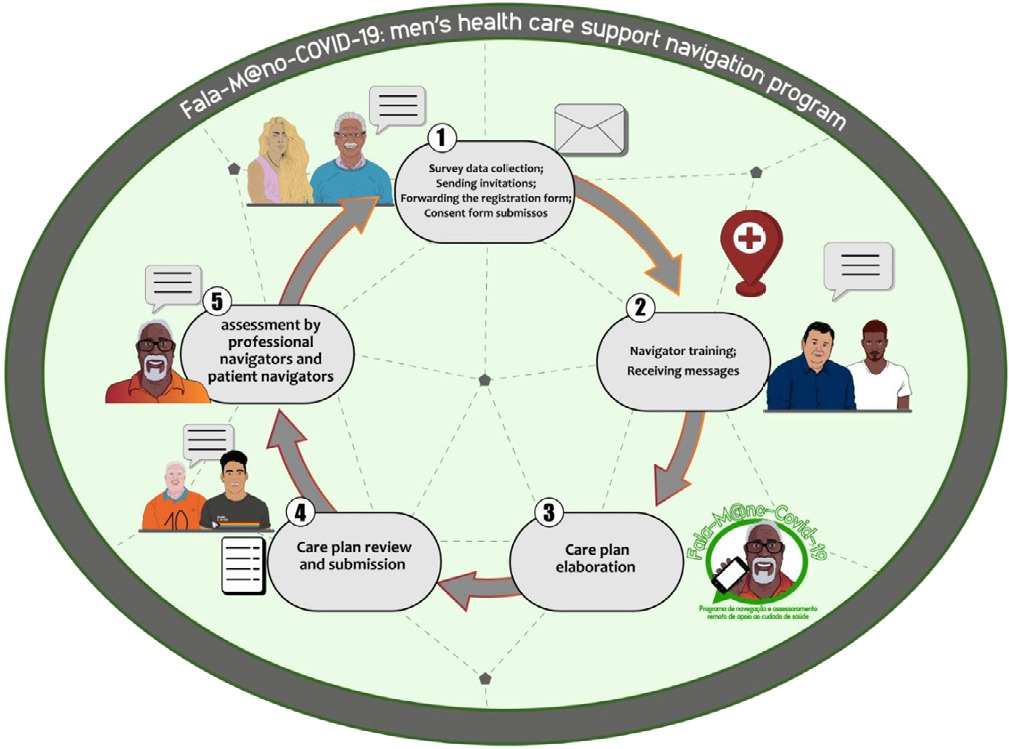
-
The Medical Healing of Souls: a strategy for welcoming post-pandemic mental health
Revista Brasileira de Enfermagem. 2023;76(6):e20220331
Abstract
The Medical Healing of Souls: a strategy for welcoming post-pandemic mental health
Revista Brasileira de Enfermagem. 2023;76(6):e20220331
DOI 10.1590/0034-7167-2022-0331
Views0See moreABSTRACT
Objective:
to reflect on the applicability of the Medical Healing of Souls (MHS) by health professionals as a welcoming strategy in post-pandemic mental health.
Methods:
a theoretical and reflective study, based on Viktor Frankl’s philosophy, based on the book “The Doctor and the Soul, From Psychotherapy to Logotherapy” and scientific literature.
Results:
the study was structured in two discursive approaches: MHS in the field of health; The applicability of MHS in post-pandemic mental health care.
Final considerations:
MHS can be used in mental health care, in health emergencies, promoting a more humane performance of health professionals, facilitating the integration of inevitable suffering into a meaningful life.
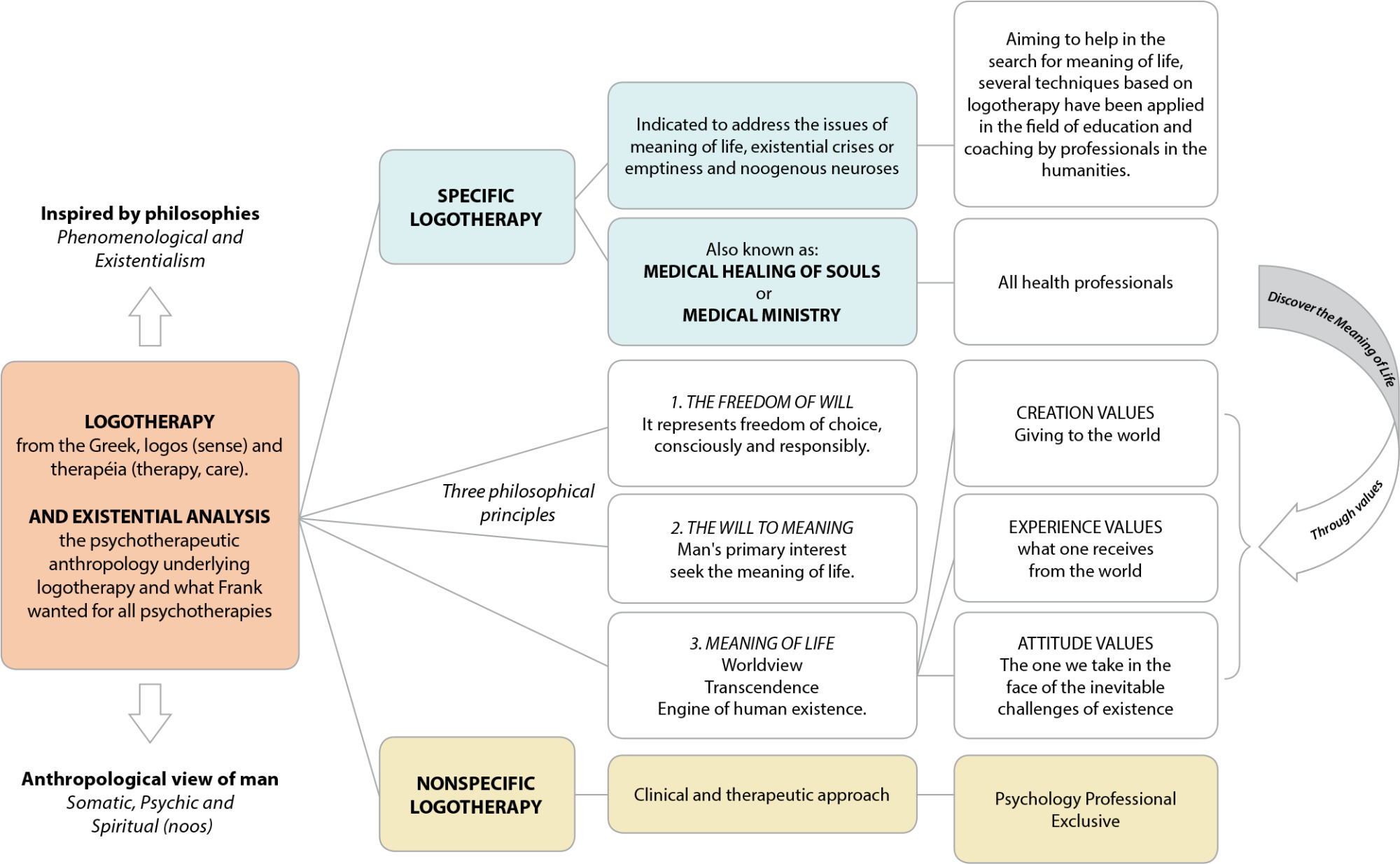
-
ORIGINAL ARTICLE12-04-2023
Translation, cross-cultural adaptation and validity study of the “Play Nicely Program: The Healthy Discipline Handbook” for use in Brazil
Revista Brasileira de Enfermagem. 2023;76(6):e20220281
Abstract
ORIGINAL ARTICLETranslation, cross-cultural adaptation and validity study of the “Play Nicely Program: The Healthy Discipline Handbook” for use in Brazil
Revista Brasileira de Enfermagem. 2023;76(6):e20220281
DOI 10.1590/0034-7167-2022-0281
Views0See moreABSTRACT
Objective:
to describe the translation, cross-cultural adaptation and validity process of the “Play Nicely Program: The Healthy Discipline Handbook” for use in Brazil.
Methods:
a methodological study that followed the translation, back-translation, expert committee assessment, and pre-test steps. The Content Validity Index (CVI) was calculated for both the judge population and the pre-test population. Four translators, seven expert judges in the field of child health and thirty participants in the pre-test, including parents, teachers and healthcare professionals, participated in the study.
Results:
in experts’ analysis (98.4%), a value of 100% of adequate assessments was obtained, and in the target population’s analysis (89.5%), there were 100% of adequate assessments. In both analyses, suggested adaptations were made.
Conclusios:
cross-cultural adaptation and content validity into Brazilian Portuguese of the “Play Nicely Program: The Healthy Discipline Handbook” were considered adequate for application in the target population.

-
ORIGINAL ARTICLE12-04-2023
Emergency units and COVID-19: Burnout, and empathy reported by nursing professionals and perceived by patients
Revista Brasileira de Enfermagem. 2023;76(6):e20210869
Abstract
ORIGINAL ARTICLEEmergency units and COVID-19: Burnout, and empathy reported by nursing professionals and perceived by patients
Revista Brasileira de Enfermagem. 2023;76(6):e20210869
DOI 10.1590/0034-7167-2021-0869
Views0See moreABSTRACT
Objective:
To investigate Burnout Syndrome and empathy self-reported by the nursing staff and empathy perceived by the patient.
Method:
Cross-sectional study in a public emergency unit in São Paulo (from October/2020 to March/2021). The nursing staff answered the Maslach Burnout Inventory and the Consultation and Relational Empathy Measure-Nurses (Brazilian version), whereas adult patients answered the Consultation and Relational Empathy Measure (Brazilian version). Descriptive and inferential analysis, with a 5% significance level.
Results:
A total of 92 professionals and 271 patients participated. Most professionals reported impact of COVID-19 (80; 86.96%) and, among them, increased Burnout Syndrome (93; 75%), but with low emotional exhaustion (71; 74%), low depersonalization (59; 78%) and high level of professional accomplishment (72; 83%). Most reported impact and increased empathy, and the results reported by professionals and patients (mean and standard deviation) were: 39.89 (6.44) and 38.25 (9.45), respectively.
Conclusion:
The professionals reported a low level of Burnout Syndrome and a high level of empathy in pandemic.
-
ERRATUM11-27-2023
ERRATUM
Revista Brasileira de Enfermagem. 2023;76(5):e2023n5e05
Abstract
ERRATUMERRATUM
Revista Brasileira de Enfermagem. 2023;76(5):e2023n5e05
DOI 10.1590/0034-7167.20237605e05
Views0In the article “Performance of Family Health Strategy Nurses in LGBT+ Healthcare”, with DOI number: , published in Revista Brasileira de Enfermagem, 2023;76(4): e20220514, authored:Where it read:[…]See more -
ORIGINAL ARTICLE11-27-2023
Mental suffering in family daily life: a temporal journey according to Merleau-Ponty
Revista Brasileira de Enfermagem. 2023;76(5):e20230258
Abstract
ORIGINAL ARTICLEMental suffering in family daily life: a temporal journey according to Merleau-Ponty
Revista Brasileira de Enfermagem. 2023;76(5):e20230258
DOI 10.1590/0034-7167-2023-0258
Views0See moreABSTRACT
Objectives:
to describe the family’s experience in relation to daily life with a family member experiencing mental suffering.
Methods:
a qualitative, descriptive, phenomenological study grounded in Merleau-Ponty’s ontology of experience was conducted in ten households in a city in the state of Bahia, Brazil, where 24 participants of the Intersubjectivity Wheels reside. The descriptions produced were subjected to the Ambiguity Analytics technique.
Results:
the descriptions were categorized into: absence as a creative power of the sense of “being” and “not being a family”; and exclusion and acceptance as expressions of mental suffering in the family context.
Final Considerations:
the experience of mental suffering in the family’s daily life is marked by ambiguous feelings, such as joy and sadness, disappointment and satisfaction, lack of love and love. However, experiencing these feelings can mobilize the desire to “become” a family, increase the sense of autonomy and independence, and drive the formation of new family configurations.
-
TECHNOLOGICAL INNOVATION03-18-2024
Nursing rights in comics: educational technological innovation report
Revista Brasileira de Enfermagem. 2024;77:e20230438
Abstract
TECHNOLOGICAL INNOVATIONNursing rights in comics: educational technological innovation report
Revista Brasileira de Enfermagem. 2024;77:e20230438
DOI 10.1590/0034-7167-2023-0438
Views0ABSTRACT
Objectives:
to report an educational technology construction on nursing professionals’ rights.
Methods:
an experience report on educational technology construction during the crediting of university extension hours in an undergraduate nursing course at a Brazilian public university, between March and June 2023. The Deming cycle was used as a procedural method.
Results:
four meetings were held between students and extension workers. Eight comic books were produced based on the Code of Ethics for Nurses, addressing professional autonomy, fair remuneration, risk-free work, denial of exposure in the media and others. The Deming cycle proved to be an important strategy for constructing products.
Conclusions:
nursing professionals’ rights must be discussed and improved. Educational technologies, such as comic books, provide playful and reflective learning.
Keywords:Education, NursingEthics, NursingGraphic NovelNursingTechnological Development and Innovation ProjectsSee more
-
ORIGINAL ARTICLE03-18-2024
Nurses’ workload during the COVID-19 pandemic: potential for experiences of moral distress
Revista Brasileira de Enfermagem. 2024;77:e20230200
Abstract
ORIGINAL ARTICLENurses’ workload during the COVID-19 pandemic: potential for experiences of moral distress
Revista Brasileira de Enfermagem. 2024;77:e20230200
DOI 10.1590/0034-7167-2023-0200
Views0See moreABSTRACT
Objectives:
to understand nurses’ experiences of moral distress related to work overload during the COVID-19 pandemic in Brazil.
Methods:
qualitative research, whose data collection occurred through individual interviews with 19 nurses who worked on the front line of COVID-19 in health services in southeastern Brazil. Data were analyzed using thematic content analysis.
Results:
work overload proved to be a powerful source of experiences of moral distress due to excessive working hours during vaccination, double working hours, a troubled relationship due to pressure from managers and the population and physical and mental exhaustion, which prevented nurses from act according to their judgment.
Final Considerations:
nurses’ work overload reflects on quality patient care and prevents nurses from acting in accordance with their moral principles, generating moral distress in nurses.
-
ORIGINAL ARTICLE03-15-2024
Cultural adaptation and validity evidence of the Student Nurse Stressor-15 (SNS-15) Scale for Brazil
Revista Brasileira de Enfermagem. 2024;77(1):e20230356
Abstract
ORIGINAL ARTICLECultural adaptation and validity evidence of the Student Nurse Stressor-15 (SNS-15) Scale for Brazil
Revista Brasileira de Enfermagem. 2024;77(1):e20230356
DOI 10.1590/0034-7167-2023-0356
Views0See moreABSTRACT
Objectives:
to carry out the cultural adaptation and evaluation of validity evidence of the Student Nurse Stressor-15 (SNS-15) Scale for use in Brazil.
Methods:
psychometric study, conducted from the stages of translation, synthesis, back-translation, review by a committee of seven experts, pre-test and evaluation of measurement properties with 32 and 238 nursing students, respectively. Descriptive statistics, Exploratory Factor Analysis (EFA), and Confirmatory Factor Analysis (CFA) were performed. The reliability of the instrument was estimated using McDonald’s Omega (ω).
Results:
EFA subsidized the distribution of the fifteen SNS-15 items into four factors. Using AFC, satisfactory fit indices were achieved (Comparative Fit Index = 0.94; Tucker-Lewis Index = 0.93; Root Mean Square Error of Approximation = 0.06; Standardized Root Mean Square Residual = 0.16) and ω = 0.86.
Conclusions:
the Brazilian version of the SNS-15 presents evidence that confirms its validity and reliability.
-
ORIGINAL ARTICLE03-15-2024
Health Management of an HIV Testing and Counseling Center: Nursing Contributions
Revista Brasileira de Enfermagem. 2024;77(1):e20230217
Abstract
ORIGINAL ARTICLEHealth Management of an HIV Testing and Counseling Center: Nursing Contributions
Revista Brasileira de Enfermagem. 2024;77(1):e20230217
DOI 10.1590/0034-7167-2023-0217
Views0See moreABSTRACT
Objectives:
to analyze the role of nursing in the establishment of an HIV/AIDS Testing and Counseling Center in a Brazilian municipality.
Methods:
a historical study utilizing primary sources, including documents and oral accounts, involving a total of ten participants. The study encompasses the years 1997 and 1998. The research took place at the Testing and Counseling Center in São João de Meriti. Data was collected from March to May 2022.
Results:
nursing made significant contributions through the development of training initiatives led by nurses, who were also responsible for individual and group counseling, as well as HIV testing requests.
Final Considerations:
nursing played a crucial role in the center and in the management of Sexually Transmitted Infections, being involved in all stages of treatment in accordance with current public health policy.
-
REVIEW03-15-2024
Factors associated with increased lactate levels in cardiac surgeries: scoping review
Revista Brasileira de Enfermagem. 2024;77(1):e20230117
Abstract
REVIEWFactors associated with increased lactate levels in cardiac surgeries: scoping review
Revista Brasileira de Enfermagem. 2024;77(1):e20230117
DOI 10.1590/0034-7167-2023-0117
Views0See moreABSTRACT
Objectives:
to map the factors associated with increased lactate levels in the postoperative period of cardiac surgery using extracorporeal circulation.
Methods:
this is a scoping review carried out in December 2022, across ten data sources. It was prepared in accordance with the recommendations of the Joanna Briggs Institute and the Preferred Reporting Items for Systematic Reviews and Meta Analyses Extension for Scoping Reviews checklist.
Results:
the most recurrent findings in studies regarding the factors responsible for the increase in lactate were: tissue hypoperfusion, cardiopulmonary bypass time and use of vasoactive drugs. In 95% of studies, increased lactate was related to increased patient mortality.
Conclusions:
discussing the causes of possible complications in cardiac surgery patients is important for preparing the team and preventing complications, in addition to ensuring quality recovery.

-
REVIEW03-15-2024
Use of podcasts for health education: a scoping review
Revista Brasileira de Enfermagem. 2024;77(1):e20230096
Abstract
REVIEWUse of podcasts for health education: a scoping review
Revista Brasileira de Enfermagem. 2024;77(1):e20230096
DOI 10.1590/0034-7167-2023-0096
Views0See moreABSTRACT
Objectives:
to map the scientific evidence related to the characteristics, themes, and outcomes of using health education podcasts aimed at individuals over 18 years of age in intra or extrahospital environments.
Methods:
a scoping review, based on the Joanna Briggs Institute method, conducted in 11 databases, including studies from 2004 to 2022.
Results:
11 studies were selected, categorized, highlighting the characteristics, evaluated outcomes, areas, and conditions of podcast application, indicating it as an effective tool for promoting behavioral change, health promotion, and social interaction, demonstrating its potential to improve well-being, quality of life, and user/client autonomy.
Conclusions:
the use of podcasts proves to be an effective, innovative, and low-cost tool, with a significant social impact, being effective for behavioral change, satisfaction, and social interaction. However, the lack of comprehensive studies on podcast development methodologies represents challenges to be overcome.

-
REVIEW03-15-2024
Resources for health literacy among caregivers of prematurely born children: a scoping review
Revista Brasileira de Enfermagem. 2024;77(1):e20230062
Abstract
REVIEWResources for health literacy among caregivers of prematurely born children: a scoping review
Revista Brasileira de Enfermagem. 2024;77(1):e20230062
DOI 10.1590/0034-7167-2023-0062
Views0See moreABSTRACT
Objectives:
to map the available evidence on resources used to promote health literacy among caregivers of prematurely born children during outpatient follow-up.
Methods:
the Joanna Briggs Institute’s scope review protocol was utilized. The search encompassed six databases, incorporating studies from 2012 to 2022.
Results:
the three included publications revealed that the resources employed are: mobile applications, phone calls, individual counseling, videos, educational pamphlets, and group discussions. Implementing an education protocol during the transition home enhances scientifically grounded health promotion rates.
Conclusions:
there is limited literature addressing the health literacy of these caregivers. The nursing team plays a crucial role in health education and in developing resources applicable to these families.

-
ORIGINAL ARTICLE03-15-2024
Effects of training Community Health Agents on dementia: a quasi-experimental study
Revista Brasileira de Enfermagem. 2024;77(1):e20230027
Abstract
ORIGINAL ARTICLEEffects of training Community Health Agents on dementia: a quasi-experimental study
Revista Brasileira de Enfermagem. 2024;77(1):e20230027
DOI 10.1590/0034-7167-2023-0027
Views1See moreABSTRACT
Objectives:
to evaluate the knowledge of Community Health Agents about dementia before and after the training workshop for detecting signs of the disease.
Methods:
a quasi-experimental study with 33 community agents, in which sociodemographic information and knowledge about dementia were collected and assessed using the Alzheimer’s Disease Knowledge Scale before and after the workshop. There were 10 weekly, online, synchronous meetings. The Student’s t-test for related samples was used, and the effect size was calculated.
Results:
while the average score on the initial assessment, using the measurement instrument, was 16.3, it was 21.24 in the final assessment. An increase in the scale score was observed after participating in the workshop, with a value of 4.94.
Conclusions:
it is urgent to invest in the ongoing education of these professionals for greater awareness in the timely detection of dementia cases in primary care and awareness of potentially modifiable factors.
Search
Search in:
Nuvem de Tags
Aged (144) Atenção Primária à Saúde (239) COVID-19 (104) Cuidados de Enfermagem (269) Educação em Enfermagem (151) Educação em Saúde (139) Enfermagem (930) Estudos de Validação (131) Health Education (144) Idoso (208) Mental Health (149) Nursing (987) Nursing Care (306) Patient Safety (151) Primary Health Care (284) Qualidade de Vida (104) Quality of Life (106) Saúde Mental (145) Segurança do Paciente (150) Validation Studies (108)




